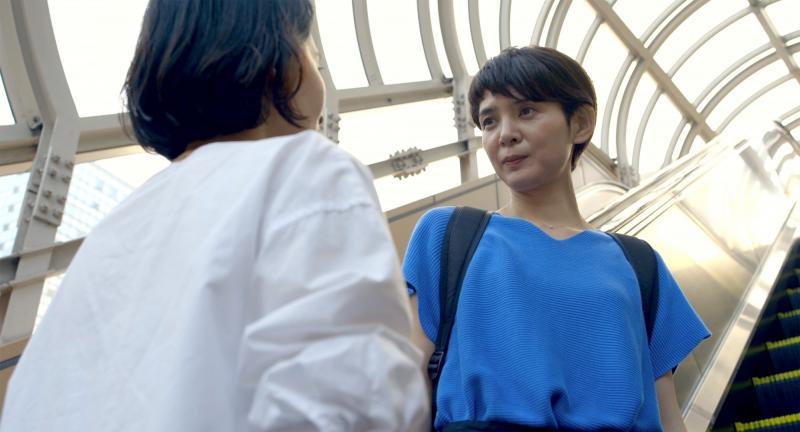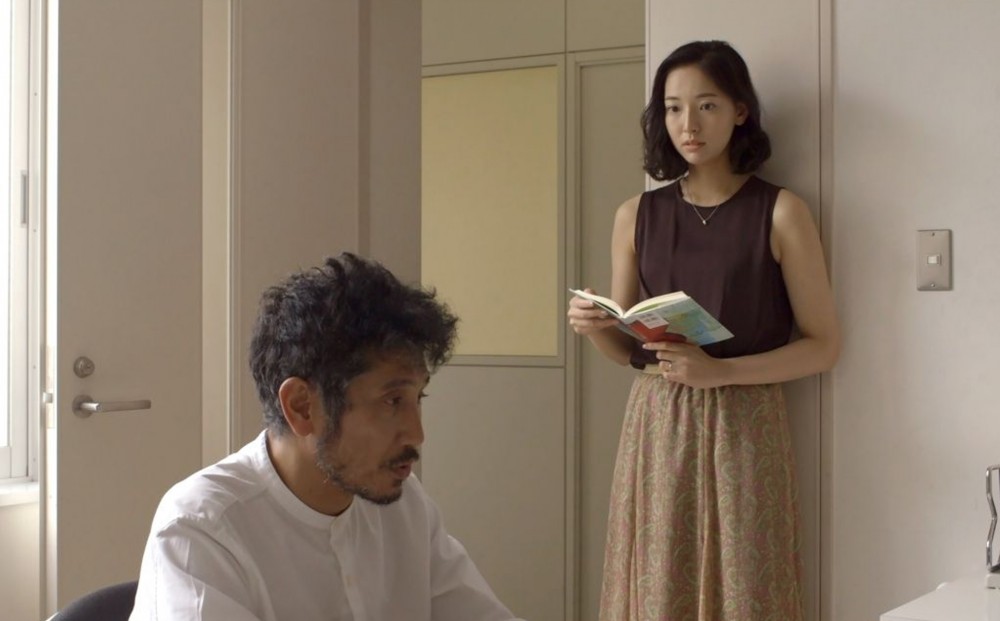Wheel of Fortune and Fantasy review - a trio of tales from Japan | reviews, news & interviews
Wheel of Fortune and Fantasy review - a trio of tales from Japan
Wheel of Fortune and Fantasy review - a trio of tales from Japan
Hot on the heels of the Oscar-nominated 'Drive My Car' comes another elliptical gem from Hamaguchi Ryusuke

With some films it’s all about the editing, a brisk parade of striking images accompanied by a kinetic score. And then there are films like Hamaguchi Ryusuke’s Wheel of Fortune and Fantasy and the Oscar-nominated Drive My Car, where the camera stays still and watches the performers watching each other talk.
Long, mainly static dialogue scenes mean that every small zoom, edit, or pan draws attention to the moment, highlighting the shift in the director’s gaze. Movies like this bring the essential voyeurism of cinema to the fore; in real life you don’t get to stare at people for hours without being observed yourself.
Wheel of Fortune and Fantasy is a portmanteau film made up of three episodes with different characters in each story. But there are overlapping themes – the imaginative notions men and women create about each other and the randomness of chance encounters. In the first episode, entitled "Magic or Something Less Assuring", two beautiful young women share a long taxi ride after a fashion shoot on the streets of Tokyo. As the sky darkens outside, Meiko encourages Gumi to tell her all about her new crush, a man she has yet to sleep with. As she rapturously describes how "they caressed each other with our conversation", Meiko realises that she knows this man, and sets off to confront him.
 The second episode, "Door Wide Open", focuses on a married student (Katsuki Mori) who doesn’t quite fit in among the undergraduates. Embroiled in a carnal relationship with a younger man who has been failed by their cerebral literature professor (Kiyohiko Shibukawa), she agrees to her lover’s plan to exact revenge with a honey trap. It’s the longest story in the film and how it unrolls is both mesmerising and brutal (pictured left, Kiyohiko Shibukawa and Katsuki Mori).
The second episode, "Door Wide Open", focuses on a married student (Katsuki Mori) who doesn’t quite fit in among the undergraduates. Embroiled in a carnal relationship with a younger man who has been failed by their cerebral literature professor (Kiyohiko Shibukawa), she agrees to her lover’s plan to exact revenge with a honey trap. It’s the longest story in the film and how it unrolls is both mesmerising and brutal (pictured left, Kiyohiko Shibukawa and Katsuki Mori).
Fortuitously, we’re soothed by the final story, cryptically titled "Once Again". Ryusuke set the action in a not-too-distant future, when a computer virus has exposed everyone’s data to the world. With online secrets revealed, people are forced to reassess their relationships and retreat to paper and pen. Two women catch each other’s eye as they pass each other travelling in different directions on escalators. Are they old high school friends meeting by chance? Or is there some other force behind this seemingly random encounter?
Ryusuke has cited John Cassavetes and Wong Kar-wai as key influences, but there were times watching his films when I was reminded more of European directors like Eric Rohmer and Michael Haneke. The focus on dialogue and performance, the everyday locations that convey a subtle backstory to the characters – these are the hallmarks of a writer-director who has really given time to his craft. The respect given to the audience is demonstrated in the absence of clunky exposition. We sit down in the dark and, once there, make what we will of these elliptical tales.
Add comment
The future of Arts Journalism
You can stop theartsdesk.com closing!
We urgently need financing to survive. Our fundraising drive has thus far raised £49,000 but we need to reach £100,000 or we will be forced to close. Please contribute here: https://gofund.me/c3f6033d
And if you can forward this information to anyone who might assist, we’d be grateful.

Subscribe to theartsdesk.com
Thank you for continuing to read our work on theartsdesk.com. For unlimited access to every article in its entirety, including our archive of more than 15,000 pieces, we're asking for £5 per month or £40 per year. We feel it's a very good deal, and hope you do too.
To take a subscription now simply click here.
And if you're looking for that extra gift for a friend or family member, why not treat them to a theartsdesk.com gift subscription?
more Film
 Die My Love review - good lovin' gone bad
A magnetic Jennifer Lawrence dominates Lynne Ramsay's dark psychological drama
Die My Love review - good lovin' gone bad
A magnetic Jennifer Lawrence dominates Lynne Ramsay's dark psychological drama
 Bugonia review - Yorgos Lanthimos on aliens, bees and conspiracy theories
Emma Stone and Jesse Plemons excel in a marvellously deranged black comedy
Bugonia review - Yorgos Lanthimos on aliens, bees and conspiracy theories
Emma Stone and Jesse Plemons excel in a marvellously deranged black comedy
 theartsdesk Q&A: director Kelly Reichardt on 'The Mastermind' and reliving the 1970s
The independent filmmaker discusses her intimate heist movie
theartsdesk Q&A: director Kelly Reichardt on 'The Mastermind' and reliving the 1970s
The independent filmmaker discusses her intimate heist movie
 Blu-ray: Wendy and Lucy
Down-and-out in rural Oregon: Kelly Reichardt's third feature packs a huge punch
Blu-ray: Wendy and Lucy
Down-and-out in rural Oregon: Kelly Reichardt's third feature packs a huge punch
 The Mastermind review - another slim but nourishing slice of Americana from Kelly Reichardt
Josh O'Connor is perfect casting as a cocky middle-class American adrift in the 1970s
The Mastermind review - another slim but nourishing slice of Americana from Kelly Reichardt
Josh O'Connor is perfect casting as a cocky middle-class American adrift in the 1970s
 Springsteen: Deliver Me From Nowhere review - the story of the Boss who isn't boss of his own head
A brooding trip on the Bruce Springsteen highway of hard knocks
Springsteen: Deliver Me From Nowhere review - the story of the Boss who isn't boss of his own head
A brooding trip on the Bruce Springsteen highway of hard knocks
 The Perfect Neighbor, Netflix review - Florida found-footage documentary is a harrowing watch
Sundance winner chronicles a death that should have been prevented
The Perfect Neighbor, Netflix review - Florida found-footage documentary is a harrowing watch
Sundance winner chronicles a death that should have been prevented
 Blu-ray: Le Quai des Brumes
Love twinkles in the gloom of Marcel Carné’s fogbound French poetic realist classic
Blu-ray: Le Quai des Brumes
Love twinkles in the gloom of Marcel Carné’s fogbound French poetic realist classic
 Frankenstein review - the Prometheus of the charnel house
Guillermo del Toro is fitfully inspired, but often lost in long-held ambitions
Frankenstein review - the Prometheus of the charnel house
Guillermo del Toro is fitfully inspired, but often lost in long-held ambitions
 London Film Festival 2025 - a Korean masterclass in black comedy and a Camus classic effectively realised
New films from Park Chan-wook, Gianfranco Rosi, François Ozon, Ildikó Enyedi and more
London Film Festival 2025 - a Korean masterclass in black comedy and a Camus classic effectively realised
New films from Park Chan-wook, Gianfranco Rosi, François Ozon, Ildikó Enyedi and more
 After the Hunt review - muddled #MeToo provocation
Julia Roberts excels despite misfiring drama
After the Hunt review - muddled #MeToo provocation
Julia Roberts excels despite misfiring drama
 Ballad of a Small Player review - Colin Farrell's all in as a gambler down on his luck
Conclave director Edward Berger swaps the Vatican for Asia's sin city
Ballad of a Small Player review - Colin Farrell's all in as a gambler down on his luck
Conclave director Edward Berger swaps the Vatican for Asia's sin city

Comments
Another fantastic film from
Another fantastic film from Ryusuke-San after the sublime Drive My Car.
I was reminded of Hal Hartley's movies - beautiful people talking but not always communicating.